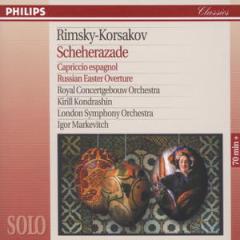Nicolai Rimski-Korsakov – Russian Easter Festival Overture (1995)
Nicolai Rimski-Korsakov – Russian Easter Festival Overture (1995)

Russian Easter Overture, Op. 36 Royal Concertgebouw Orchestra Igor Markevitch - conductor
In the summer of 1888, Rimsky-Korsakov completed the orchestration of the Russian Easter Overture, and he finished another of his major works, Scheherezade. The Russian Easter Overture was often regarded by the composer as "The Bright Holiday," which was a popular Russian name for Easter. The Russian Easter Overture is based on themes from the obikhod, which is a printed collection of the most important and most frequently used canticles of the Russian Orthodox Church. This volume represented the first music ever printed in Russia.
The overture begins with a long introduction of a very slow tempo. Rimsky-Korsakov wrote that this opening section of the piece was inspired by Isaiah's prophetic words concerning the future resurrection of the Messiah. The composer claims that the music of the section, which alternates themes from "Let God Arise" from the obikhod and the ecclesiastical theme of "An angel wailed," simply "appeared" to him. The voice of an archangel is represented by a dark trumpet solo.
The slow introduction leads into a transition which becomes the Allegro of the overture. While the introduction was solemn and mysterious, the Allegro is joyous, conveying a sense of excitement. Trumpet blasts, along with a sense of bell-tolling, push the idea of merriment to the fore. An image of a sexton quickly reading to the congregation is also present. Another obikhod theme, "Christ is arisen," is heard in this section, although it is greatly overshadowed by other sounds.
In the Russian Easter Overture Rimsky-Korsakov attempted to show the contrast between the ancient wonder of Isaiah's proclamation with the almost-Pagan celebration of Easter in modern times. The composer wanted the listener to recognize the parallels between their own actions and biblical tales of "pagan merry-making." He also believed that to make this connection, the listener would have needed to attend an Easter morning service in a cathedral with all types of people. In his childhood, the composer did experience this type of thing. Obviously, Rimsky-Korsakov believed that the religious services of his time were "a far cry from the philosophic and socialistic teaching of Christ." In the program for the first performance of the overture, Rimsky-Korsakov provided prose and Bible verses (two from Psalm 68 and six from the Gospel of Mark, chapter 16) to accompany the work, but he did not speak of his true intentions. He decided that it would be best to allow the "tones to speak for [him]." ---Chris Boyes, Rovi
download: uploaded yandex 4shared mediafire solidfiles mega zalivalka filecloudio nornar anonfiles gett ziddu
Zmieniony (Środa, 09 Kwiecień 2014 21:00)








